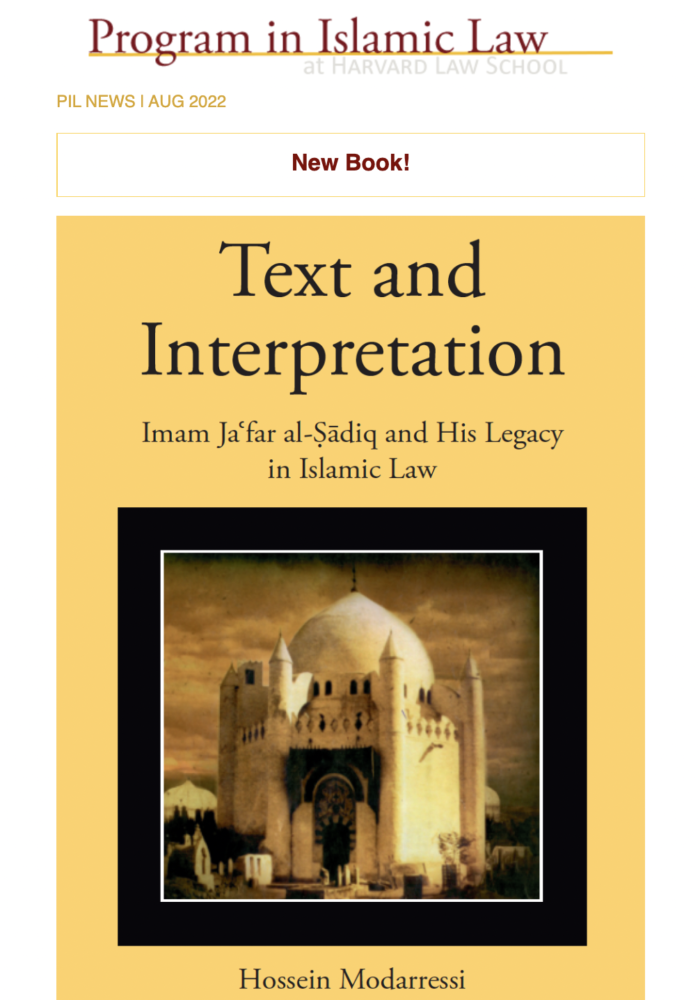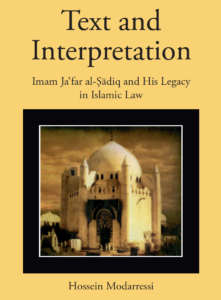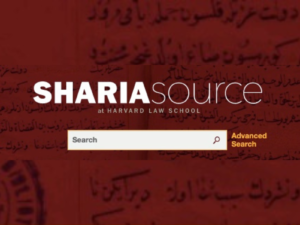
 New Book! We are excited to announce the publication of the latest book in our Harvard Series in Islamic Law, Hossein Modarressi‘s Text and Interpretation: Imam Jaʿfar al-Ṣādiq and His Legacy in Islamic Law! This book examines the main characteristics of the legal thought of Imam Jaʿfar al-Ṣādiq, a preeminent religious scholar jurist of Medina in the first half of the second century of the Muslim calendar (mid-eighth century CE). Numerous works in different languages have appeared over the past half century to introduce this school of Islamic law and its history, legal theory, and substance in contexts of Shīʿī law.
New Book! We are excited to announce the publication of the latest book in our Harvard Series in Islamic Law, Hossein Modarressi‘s Text and Interpretation: Imam Jaʿfar al-Ṣādiq and His Legacy in Islamic Law! This book examines the main characteristics of the legal thought of Imam Jaʿfar al-Ṣādiq, a preeminent religious scholar jurist of Medina in the first half of the second century of the Muslim calendar (mid-eighth century CE). Numerous works in different languages have appeared over the past half century to introduce this school of Islamic law and its history, legal theory, and substance in contexts of Shīʿī law.
While previous literature has focused on the current status of the school in its developed and expanded form, this book presents an intellectual history of how the school began. The Jaʿfarī school emerged within the general legal discourse of the late Umayyad and early Abbasid periods, but was known to differ in certain approaches from the other main legal schools of this time. Namely, the Jaʿfarī school expanded the tools for legal interpretation generally and contracts specifically, to a degree unmatched by any of its counterparts in the Muslim legal tradition. In addition to sketching the origins of the school, the book examines Jaʿfar al-Ṣādiq’s interpretive approach through detailing his position on a number of specific questions, as well as the legal canons, presumptions, and other interpretive tools he adopted.Alongside its release, we’re also publishing a series of blog posts over the next month on our Islamic Law Blog that take a deep dive into the book, which will be followed by the release of an Online Companion to the book on our SHARIAsource portal. Get your hands on a copy today and stay tuned for all that’s to come!
 CONTENT: Muslim Marriage in South Africa As part of its growing archive of contemporary primary sources to support research on salient issues of Islamic law, SHARIAsource features the South African Constitutional Court’s confirmation of the Supreme Court of Appeal’s order to amend existing legislation or enact new legislation to recognize and regulate the consequences of Muslim marriages. The order declared certain provisions of the Marriage Act and the Divorce Act unconstitutional due to the persistent non-recognition of Muslim marriages, or marriages solemnized in accordance with the tenets of sharīʿa, that have resulted in the infringement of fundamental rights of parties to Muslim marriages, and Muslim women and children in particular. The Constitutional Court confirmed this order stating that “the common law definition of marriage is declared to be inconsistent with the Constitution and invalid to the extent that it excludes Muslim marriages.” Explore the document today!
CONTENT: Muslim Marriage in South Africa As part of its growing archive of contemporary primary sources to support research on salient issues of Islamic law, SHARIAsource features the South African Constitutional Court’s confirmation of the Supreme Court of Appeal’s order to amend existing legislation or enact new legislation to recognize and regulate the consequences of Muslim marriages. The order declared certain provisions of the Marriage Act and the Divorce Act unconstitutional due to the persistent non-recognition of Muslim marriages, or marriages solemnized in accordance with the tenets of sharīʿa, that have resulted in the infringement of fundamental rights of parties to Muslim marriages, and Muslim women and children in particular. The Constitutional Court confirmed this order stating that “the common law definition of marriage is declared to be inconsistent with the Constitution and invalid to the extent that it excludes Muslim marriages.” Explore the document today! CONTEXT: Mariam Sheibani Fellow Spotlight Our Fellow Spotlight series features interviews with current and previous Program Fellows, highlighting their work with the Program in Islamic Law, their path getting here, and the road going forward. This month we featured one of our previous fellows, Professor Mariam Sheibani! Professor Sheibani is currently Associate Academic Director at Cambridge Muslim College and will be an Assistant Professor at Brandeis University starting in September 2023. Her research explores the ways in which Islamic thought has evolved to reflect changing socio-cultural realities in late antique and medieval Muslim societies. During her time at PIL, she worked on the Islamic Law Blog as Lead Blog Editor, overseeing a monthly blogger series and a bi-annual roundtable. To learn more about her path to becoming a scholar, her work during her time at Harvard, what she is up to now, and what she likes to do for fun, visit our blog!
CONTEXT: Mariam Sheibani Fellow Spotlight Our Fellow Spotlight series features interviews with current and previous Program Fellows, highlighting their work with the Program in Islamic Law, their path getting here, and the road going forward. This month we featured one of our previous fellows, Professor Mariam Sheibani! Professor Sheibani is currently Associate Academic Director at Cambridge Muslim College and will be an Assistant Professor at Brandeis University starting in September 2023. Her research explores the ways in which Islamic thought has evolved to reflect changing socio-cultural realities in late antique and medieval Muslim societies. During her time at PIL, she worked on the Islamic Law Blog as Lead Blog Editor, overseeing a monthly blogger series and a bi-annual roundtable. To learn more about her path to becoming a scholar, her work during her time at Harvard, what she is up to now, and what she likes to do for fun, visit our blog!
See the full newsletter.

